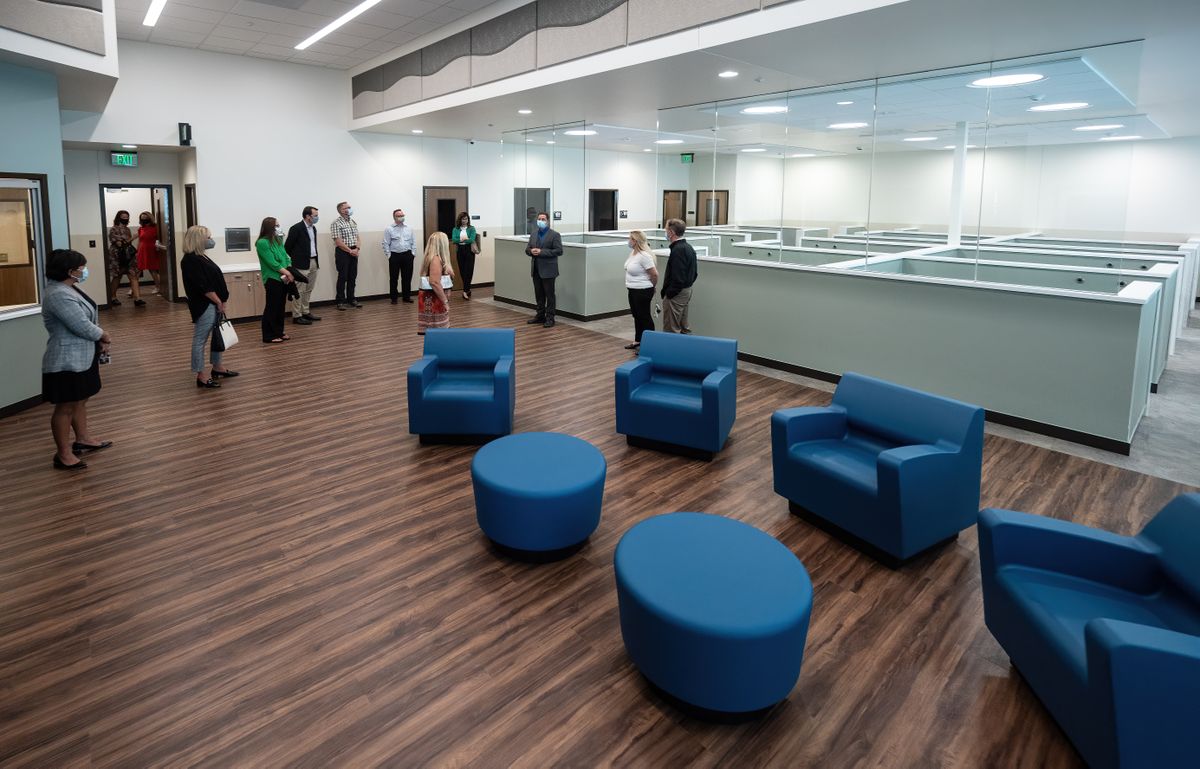County officials on Monday unveiled an overnight recovery center that will offer a range of medical and mental health services as part of an effort to address those who often cycle through jail and emergency rooms without ever getting treatment.
After the yearslong effort to open the Spokane Regional Stabilization Unit at 1302 W. Gardener Ave., the Spokane County Board of Commissioners – joined by Mayor Nadine Woodward, Spokane Police Chief Craig Meidl, state representatives and private contractors – cut the ribbon on the multiroom crisis center that was transformed from a motor pool building.
The unit will have a soft opening Oct. 1, said Kirsten Gable, senior consultant at Sapere Consulting who offered tours of the almost-finished facility Monday afternoon during a press conference.
“The whole goal is to get people stabilized out of mental crisis, and then really be able to evaluate, you know, what the key root causes are,” Gable said. “They may need at that point to go into some sort of withdrawal management, or they may need to go into a program. And that’s really the whole goal, to reduce the transfer between different facilities and have all these programs here.”
Funded by grants and state dollars, as well as some city and county dollars, the facility will have 47 beds, detox rooms, medical checkup rooms and a place where participants can get their medication, Gable said. Space for withdrawal management will address the more physically challenging effects of substance use, she said.
Those staying at the center will also have kitchen and laundry units they can freely use, with supplies provided, Gable said.
A 24-hour nursing staff will accompany substance use counselors and behavioral health clinicians in efforts to give a “full-range of services,” Gable said. All in all, about 60 full- and part-time staff members will attend to the center’s participants, she said.
Meidl said the unit will serve as another option for law enforcement when answering calls for people who are causing public disturbances but have addiction or mental health challenges.
“Jail is not always the best option for a lot of people that we deal with, but we have to remove them from the scene,” Meidl said. “Emergency rooms are not always the best option. This provides a niche for that gray area and will give our officers and our deputies a lot more flexibility in trying to get these individuals that extra support that they need as well. So this is a huge evolution for us, and it’s just a example of the region’s staying at the front end of the trends nationwide as well.”
Jails and emergency rooms often fill with repeat offenders of low-level crimes or substance use issues. In Spokane County, some individuals who needed treatment cycled through an average of 35 times, according to a 2016 report from the Washington Office of Financial Management.https://6711eb4ce20a52fc35367476ba739e88.safeframe.googlesyndication.com/safeframe/1-0-38/html/container.html
This center will see pre-booked individuals, or those who have not been charged with a crime but were escorted to the center by police. They can leave whenever they want and don’t need to have an officer with them to get inside, Gable said.
Of pretrial detainees in Washington State, the OFM report found 70% were arrested twice in a 12-month period. More than half, 55%, had a substance use disorder diagnosis, though only about 5% got any kind of treatment for their addiction, the report stated.
Karen Lee, CEO of Pioneer Human Services that contracted with the county commissioners to develop the unit, said the facility would serve to treat substance use and mental illnesses as medical conditions that deserve a non-judgmental approach.
“I think for many of us in Washington, we thought treatment was incarceration,” Lee said. “And today, we know that that’s really not the case. … It’s a stabilization center that gives another option – a humane option – to law enforcement so it doesn’t have to be going to jail, right, it doesn’t have to be clogging up an ER.”
The facility opens after years of collaboration between government offices and private contractors. Spokane’s Democratic State Rep. Marcus Riccelli said legislators in 2019 allotted $2.2 million in the state’s capital budget for jail diversion efforts. A year later in July 2020, Spokane County filed a permit for the 18,800-square-foot space on West Gardner. Then, in October, the Spokane City Council committed $1.1 million for the facility’s opening.
But this wasn’t just a year or two in the making, said Alison Poulsen, CEO of Better Health Together, which also partnered with local officials to develop the center.
“When I arrived at Better Health Together nine years ago, we were talking about hot-spotters, high utilizers, folks who were cycling through the system. And there was a group of people who were like, ‘We can do better, we know we can do better,’ ” Paulson said.
With the range of conditions they expect to see in participants, Gable said people could stay anywhere from a few hours to several days. Medicaid and Medicare, insurance providers that represent many of the repeat offenders in the system, will cover about two weeks for a stay at the stabilization center, Gable said.
“Really the goal is to connect them with services. … The value in the facility is having all these things under one roof and also allowing for the longer stays because sometimes it just takes time,” Gable said.
SHARE